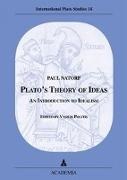Read more
Paul Natorp's monumental work, Plato's Theory of Ideas. An Introduction to Idealism (1903, 2nd ed. 1921), is a fascinating and highly original work which merits renewed study not only as a significant document of German Neokantianism, but as an important contribution to our understanding of Plato.
Natorp's interpretation, far from being an uncritical projection of Kant back onto Plato, is a remarkable attempt to dissociate the theory of ideas from its Aristotelian reception, still dominant today, which sees the ideas as transcendent substances, and to argue that Plato's theory is basically a theory of explanation.
In particular, Natorp argues that Plato's ideas are simply explanations, or laws, rather than substances; and what the ideas explain is in the first instance the possibility and nature of thought and knowledge, and only as a consequence the nature of reality. Natorp emphasizes the broadly Kantian origins of his approach, but he takes issue with Kant on a number of crucial points, and this not least is what allows him to defend a transcendental interpretation of Plato's theory of ideas.
This volume contains a complete translation of Plato's Theory of Ideas; an introduction which summarizes Natorp's interpretation of Plato, its relation to Aristotle and Kant, and its continued importance; along with a postscript which positions Natorp within German, and in particular Marburg, Neokantianism.
About the author
Der renommierte Philosoph und Pädagoge Paul Natorp (1854-1924) war neben Hermann Cohen der bedeutendste Vertreter der Marburger Schule des Neukantianismus, die von Friedrich Albert Lange ins Leben gerufen worden war. Natorp studierte Musik, Geschichte, klassischePhilologie und Philosophie und verfasste seine Dissertation 1876 in Straßburg bei Ernst Laas (1837-1885). Anschließend ging er nach einer vorübergehenden Beschäftigung als Hauslehrer nach Marburg. Dort habilitierte er 1881 bei Hermann Cohen und wurde vier Jahre späteraußerordentlicher Professor. Neben seinen Verdiensten auf dem Gebiet der Philosophie ist bemerkenswert, dass Natorp auch ein begabter Komponist war - überliefert sind etwa 100 Lieder und zwei Chorwerke.

